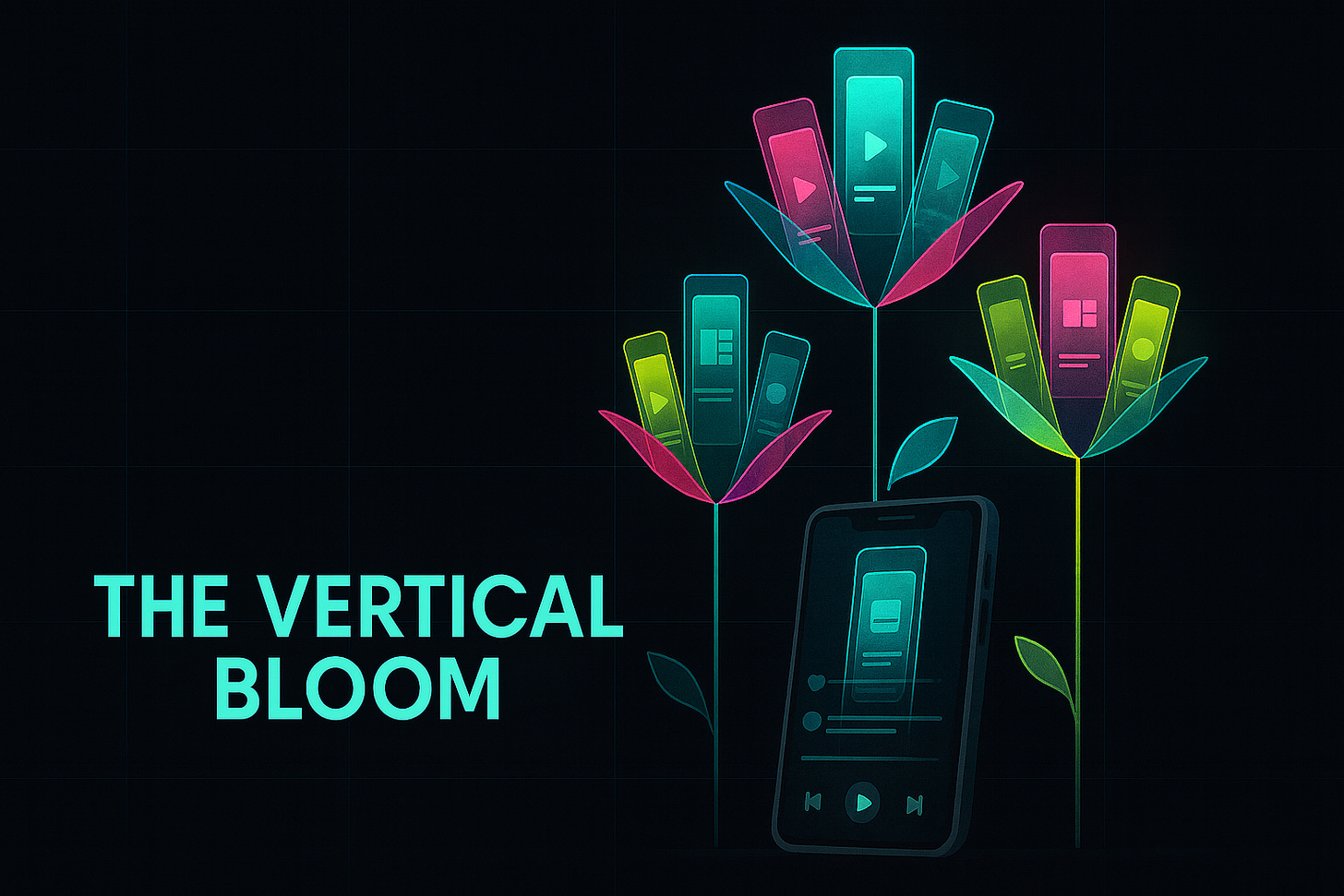Welcome to The Vertical Bloom, a weekly dive into the fast-growing world of microdramas and vertical storytelling. Here, we unpack the platforms, creators, and deals shaping the format that’s quietly redefining what it means to make—and watch—television in the mobile age.
Fresh Takes
E! Entertainment founder Alan Mruvka is self-funding a new vertical platform, Verza TV, slated to launch in mid-November. Drawing on his legacy in celebrity-driven entertainment, Mruvka promises a slate of “TikTok-inspired dramas, reality micro-content, exclusive red-carpet interviews, and fan-favorite microdramas.” Verza enters the market amid a wave of legacy media pivots toward the vertical space. The message is clear: the short-form boom isn’t just a creator trend—it’s Hollywood’s next battleground.
This past week at MIPCOM, microdramas took center stage…
ReelShorts’ 71-part American melodrama Breaking the Ice opened The Wit’s Fresh TV Fiction showcase at Cannes this year—a telling sign of how quickly television is evolving. The series, which has drawn roughly 340 million U.S. views, was spotlighted as proof that vertical, serialized storytelling is no longer a fringe experiment but a fixture in the global entertainment conversation.
As reported by GECA, a Spanish audio-visual analyst company, microdramas are now the most-consumed content in Colombia, overtaking global streamers and local titans of Film/TV. And this isn’t surprising. Verticals are growing rapidly throughout LATAM with hubs of production sprouting throughout the continent.
LATAM isn’t alone. Also at MIPCOM, Lebanon’s Scene and Arab Entertainment giant Rotana Media have announced a partnership to produce and release a slate of microdramas, introducing the medium to the Arab world for the first time…
At the Shanghai–London Screen Industry Forum…
Chinese and British executives pointed to microdramas as the next frontier for co-production between the two nations. Industry magnates cited that short, vertical, and mobile-first is content ideal to test IP, new markets, and scalability. These collaborations could be the trailblazing kick needed to see new genres, structures, and content being made. Microdramas are officially part of the global playbook.
The soil’s rich with new developments, but let’s see which sprouts are standing taller than the rest…
Platform Spotlight
Vigloo, a South Korean platform, is redefining the microdrama space from all angles. They’ve established a clear intention of breaking into the American market and have proven it by acquiring major IP—including a New York Times bestseller. Some of its series are even produced entirely with generative AI, blending tech innovation with K-drama storytelling flair. Ambitious and experimental, Vigloo feels less like a follower and more like a glimpse of where vertical entertainment could be headed.
Some quotes from Neil Hyuk-jae Choi, CEO of SpoonLabs—the media conglomerate that owns Vigloo…
Vigloo Logo // Posters for Generative-AI-made microdramas released on their app
Show Spotlight
Audrey in Full Bloom (ReelShorts):
Logline: A newly minted Latina CEO with a hidden identity battles corporate sabotage and a rival-turned-suitor, proving she belongs at the helm of her family’s billion-dollar empire.
Genre: Billionaire Romance / Corporate Melodrama
This 64-part series on ReelShorts has quickly become one of the platform’s top performers—amassing over 23.4 million views. Each 90-second episode hits the microdrama sweet spot: fast-paced storytelling, romantic tension, and a relatable setting that keeps viewers scrolling. It’s a near-perfect case study in what makes the format thrive—and why audiences can’t look away.
To understand what this kind of success means for the industry, I turned to the people shaping it behind the scenes…
Industry Insider
Microdrama screenwriter Julie Tucker sees a clear pattern: vertical dramas thrive on the humiliation-to-empowerment arc. It’s the engine behind hits from China to Ukraine—a formula that works because it always delivers transformation. But—she points out—that the million-dollar-question remains: will it translate to the U.S.?
In Asian markets, success often hinges on the revelation—the underdog who turns out to be royalty, finally claiming their power. In the U.S., however, audiences crave something more internal: vindication through confidence, stories rooted in self-realization rather than sudden status. It’s the same desire for triumph, just told through a different lens.
On the other hand…
Microdrama Producer Brandan Dennehy argues that misreading audience DNA is what leads to failure more than bad ideas. His data shows that Sports Romance, made popular through BookTok and self-publishing, are the most overlooked goldmine waiting for exploitation. For example, while consulting a major vertical platform, they opted for a Basketball-Rom over his data-backed Hockey-Rom. The result? A flop, while a rival’s Hockey Romance title pulled 590 million views in 10 months, plus another 200 million from Football Romance.
Sports Romance already carries the same mechanics that make vertical dramas addictive: fast emotional escalation, high-stakes intimacy, and rhythmic payoffs. The training montage becomes foreplay; the championship, a confession. The demand is already there. The opportunity lies in execution—delivering familiar tropes with precision, speed, and vertical-native storytelling flair.






Excellent analysis; it is truly insightful to consider how quickly vertical storytelling is not just emerging but actively redefining the fundamental structure of mobile entertainement. One must ponder, what if this rapid shift toward microdramas eventually prompts a more significant integration of generative AI not only for content personalization but also for the automated construction of serialized narratives, fundamentally altering production pipelines?
Great to see Audrey In Full Bloom on here. I produced and directed this film. Thanks for the shout out.